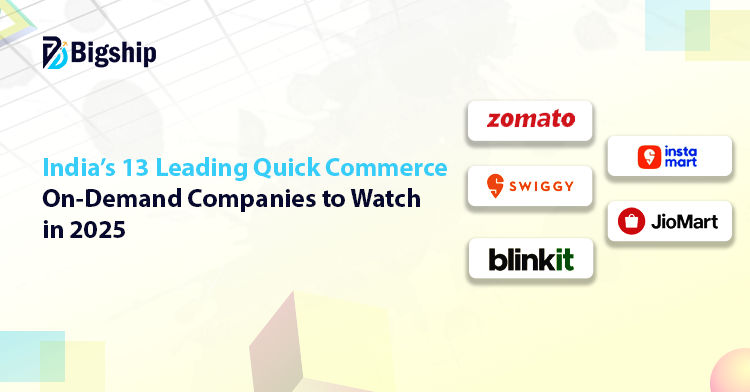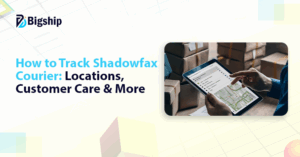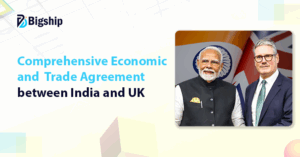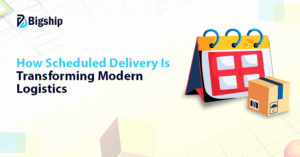The Indian quick commerce system is experiencing a great change that is going to completely change the purchasing behaviour of the modern consumer, who is going to buy everything from groceries and snacks to personal care and home essentials. The delivery of the items that are being delivered within a few minutes has become a common practice, and the brands are competing to fulfil the instant delivery demand among consumers through hyper-fast drop-offs.

Quick commerce is all about speed, a lifestyle that enables users to receive their orders in a very short time. Let’s discuss the top quick commerce firms that are ruling India’s on-demand delivery market.
Key developments shaping India’s quick commerce growth:
- The quick commerce sector is likely to reach USD 5.5 billion by the end of 2025, with a very robust growth plan to go beyond metros into tier 2 and 3 towns.
- Top players in the market like Blinkit, Zepto, and Swiggy Instamart are experiencing almost 280% sales growth, which points to a higher dependence on instant delivery.
- Competitors like Flipkart Minutes and Amazon Fresh are entering the market and making it more challenging, thus pushing the innovation and speed even further in the Q-commerce area.
Why is quick commerce booming?
- Consumers have changed their perception about delivery times, and now they want goods to be delivered immediately.
- The demand is met with an expanding network of dark stores in the urban areas, which are faster in dispatching goods.
- Logistics are tech-driven, and routing is AI-based, thus giving a boost to the delivery speed and efficiency
- Working together with local retailers and grocer’s enables us to offer a wider selection of products and to have more stock available.
What is quick commerce?
Quick commerce, often referred to as q-commerce, is the ultimate stage of online shopping evolution that is specifically designed for instant gratification. Customers do not have to wait hours or days for deliveries; instead, they receive their essentials in 10 to 30 minutes. It is the concept that suits the present-day shopper who is looking for speed, seamless service, and 24/7 convenience.
This setup is essentially built on a hyperlocal network of dark stores that are located within the vicinity of busy neighbourhoods. These small-sized, smartly located warehouses are stocked with everyday items that must be available, like groceries, snacks, cleaning supplies, personal care products, and fresh produce. The moment an order is placed, the nearest dark store picks, packs, and gives it to a delivery partner this way, the order is delivered almost instantly to the customer.
Core elements of quick commerce
The merging of technology, efficient micro-warehousing, and hyperlocal logistics has enabled quick commerce platforms to offer an experience that feels almost instantaneous, thus setting the standard for convenience in modern retail. Here are its core elements.
- Ultra-fast fulfilment: The whole process from picking to dispatch is made to takes minutes.
- Smart routing systems: AI-supported route finding helps riders cover the shortest and quickest roads.
- High-demand product selection: It is limited to items that are needed most and often.
- Proximity-based warehousing: Quick delivery is made possible by dark stores located near residential clusters.
Top 13 Quick Commerce Companies in India
Customers’ demand for instant access to groceries, daily essentials, and ready-to-eat items is growing rapidly. India’s quick commerce ecosystem is growing at an unusual rate. The brands are heavily investing in hyper-local warehousing, AI-driven routing, and smart delivery infrastructure to bring the products to consumers in record time. Here is the updated list of the leading players that are contributing to India’s ultra-fast delivery revolution.
Comparison Table: India’s Leading Quick Commerce Companies (2025)
| Company Name | Delivery Time | Product Range | Unique Selling Point |
| Flipkart Minutes | 10 minutes | Groceries, Electronics | Flexible order cancellation |
| Amazon Fresh | 2-hour delivery | Groceries, Essentials | Rigorous 4-step quality check |
| Blinkit Bistro | 15 minutes | Ready-to-eat meals | Specialized in instant food delivery |
| Zepto | 10 minutes | Groceries, Household Items | AI-powered fulfillment system |
| Zomato | 20 minutes | Grocery, Essentials | Uses its extensive food delivery network |
| Swiggy Instamart | 10–30 minutes | Fresh produce, Dairy | Rapid expansion into new service zones |
| BigBasket BB Now | 15–30 minutes | Groceries, Essentials | Built on BigBasket’s strong ecosystem |
| Dunzo Daily | 15–20 minutes | Essentials, Beverages | Strategic partner-driven sourcing |
| M-Now (Myntra Now) | Same-day delivery | Fashion, Accessories | Personalized AI-backed suggestions |
| FreshToHome Express | Same-day delivery | Meat, Seafood | Direct farm-to-fork supply chain |
| JioMart Express | 10–20 minutes | Groceries, Electronics | Strength of Reliance’s supply chain |
| Ola Food & Grocery | 20–30 minutes | Food, Grocery Items | Powered by Ola’s rideshare network |
| Slikk | 15–30 minutes | Premium Lifestyle Goods | Intelligent automated micro-fulfillment |
1. Flipkart Minutes
Flipkart Minutes, launched in July 2024, was a significant milestone in the development of India’s quick commerce field. The platform, supported by Flipkart’s enormous logistics network, delivers groceries and other necessities in as little as 10 minutes, which makes it one of the most strategic expansions by an e-commerce giant in recent years.
The service showcases a wide variety of items from groceries and daily-use essentials to personal care products and even electronics. What sets it apart is its customer-friendly cancellation flexibility, where users have the option to reject the order if the service does not meet their expectations, which is hardly ever seen in the quick commerce segment.
2. Amazon Fresh
Amazon Fresh serves as Amazon’s hyper-efficient grocery and essentials delivery arm, tailor-made for customers seeking swift, reliable service. While the platform originally debuted in 2019, Amazon has been continually enhancing its quick delivery capabilities to stay competitive with speed-driven platforms like Blinkit and Zepto.
Operating on a 2-hour delivery promise across more than 300 cities, including numerous tier-2 and tier-3 markets, Amazon Fresh emphasizes product quality above all.
3. Blinkit Bistro
The Zomato brand, called Blinkit Bistro, has entered the quick commerce industry, which is providing super speedy delivery of ready-to-eat food, beverages, and snacks. The service commenced in December 2024, and now the service has already covered many regions in Gurugram and is gaining recognition for its instant food deliveries.
One of the features Blinkit Bistro is highlighting is 15 minutes of delivery time. The company wants to win over the growing consumer market that prefers to have meals and beverages delivered by taking the Zomato brand to new and existing markets. Besides, plans for entering major metro areas in 2025 are already in place, which shows an even wider strategy focused on the instant meal industry.
4. Zepto
Zepto has quickly positioned itself in the Indian quick commerce segment as one of the significant players offering reliable 10-minute deliveries and getting the dependability statement attached to the service. The company has also created an incredible hyperlocal network comprising more than 100 dark stores in the areas of Mumbai, Bangalore, Delhi, Chennai, Hyderabad, and Pune.
The quality that makes Zepto different from other players is the precision-driven logistics engine that uses AI-driven route planning along with real-time inventory systems. This technological advancement enables the company to not only decrease the length of the delivery routes but also to enhance the order processing and the overall company’s efficiency. Zepto, with its explosive growth trend and valuation exceeding the USD 1 billion limit, is not only continuing to scale but also moving on to new service areas.
5. Zomato
Zomato, once known only for food delivery, now has a grocery and essentials delivery service that puts it into the quick commerce industry. The company uses delivery partners who guarantee that delivery times are below 20 minutes; hence, they have positioned themselves strongly within the ultra-fast delivery sector.
Zomato is strengthening its q-commerce presence through new partnerships and improved logistics capabilities, and this is a wise decision. The company plans to make grocery and essentials delivery even faster, thus turning into an all-inclusive instant delivery platform that also caters to restaurant orders.
6. Swiggy Instamart
In no time, Swiggy Instamart has become one of the most vibrant quick commerce platforms in India, changing the way consumers buy their regular necessities. The assortments of items that include fruits and vegetables, dairy, snacks, cleaning supplies, and more, Instamart guarantees orders within 10 to 30 minutes, thus taking care of both speed and convenience.
The app’s working is supported by an intelligent network of dark stores that ensures rapid fulfilment of online orders and very quick customer service. Now active in over 25 cities, Swiggy Instamart continues to scale aggressively as demand for rapid grocery delivery surges across India.
7. BigBasket BB Now
BigBasket BB Now is no longer just the name for the online grocery delivery service but also the name for the quick commerce sector that the company has now entered. This service is already competing with Blinkit and Swiggy Instamart as it offers and promises 15 to 30 minutes delivery through several micro-warehouses implemented in the metro cities.
The platform features an extensive product range, which contains fresh organic vegetables, milk, tea, coffee, packaged snacks, and even cosmetics and toiletries. One of the major traits that sets it apart from others is the flawless linkage with BigBasket’s chief platform, which lets users toggle between scheduled purchases and quick orders without fuss.
8. Dunzo Daily
Dunzo Daily, a part of the Dunzo ecosystem, specializes in the local delivery of the essentials of daily use. The company Dunzo, which was originally known for its on-demand courier services, had to go into groceries when it saw that the quick commerce market was growing.
Dunzo Daily operates in Bangalore, Delhi NCR, Chennai, Pune, and Mumbai, and in these locations, it uses dark stores to deliver fresh produce, beverages, dairy products, and packaged foods in 15 to 20 minutes. The reason for its delivery time is its unbundled model, which focuses on partnership, contrary to owning the total inventory. Dunzo has been able to get such low prices on the products by working with the best retailers and brands that help in the sourcing, reducing the operational costs, and keeping prices competitive.
9. M-Now (Myntra Now)
M-Now, Myntra’s instant delivery service, has now opened the door for the fashion world to experience the quick commerce trend. The platform has changed its course from groceries to clothes, accessories, and beauty products; thus, it has the option of same-day or 2-hour delivery in some areas.
One of the greatest advantages of this service is the AI-powered recommendation engine that works in real-time and, thus, produces very personalized product suggestions. Among the partnerships with brands like H&M, Nike, and other luxury labels, M-Now is the direct channel to the highest fashion that is no longer at the farthest end of the customers.
M-Now is using dark stores and a strong fulfilment infrastructure to make the customer experience and loyalty even better. The brand is taking a step down to the tier-2 markets now and then making the “quick fashion” trend mainstream in India.
10. FreshToHome Express
FreshToHome Express limits its business to perishables that are very fresh, high-quality, and usually considered to be the least perishable: meat, fish, and organic vegetables. The company, through its solid farm-to-fork model, can deliver on the same day and with the least amount of freshness loss.
It is in Bangalore, Mumbai, Chennai, and Hyderabad where FreshToHome operates and supplies very fresh products from farms and fisheries through direct sourcing. This not only saves the producer time but also keeps the customer supplied with cleaner, safer, and more authentic products.
11. JioMart Express
JioMart Express from Reliance Retail is one of the fastest-growing players in the quick commerce ecosystem of India. The platform, which is aimed at the super-fast delivery of groceries and daily essentials, is supported largely by Reliance’s vast retail and supply chain network.
JioMart Express is leveraging dark stores as its business model, which helps it to control the inventory in real-time and process orders faster. A huge part of the company’s strengths lies in the seamless integration of Reliance Fresh and Smart stores, which helps to expand quickly without needing to invest heavily upfront.
12. Ola Food & Grocery Delivery
Ola, the company that is mostly identified by its ridesharing service, has entered the quick commerce market through its food and grocery delivery wing. The operative principle of this service is the dark store location that is well thought out and makes a 20-30 minute delivery time possible.
The service reaches the metro cities, besides retail, and utilizes its existing driver staff for deliveries during times when ride demand is low, thus improving fleet efficiency. Additionally, the company is playing around with cloud kitchens, which will help strengthen its food service and compete head-on with Swiggy Instamart and Zomato.
13. Slikk
Slikk is a new quick commerce start-up that is going to be the first tech-driven challenger in the industry. The company is all about super-fast delivery that is possible through automated micro-warehousing and sophisticated AI systems.
Slikk is directly opposite to conventional players and plans to have extensively automated distribution centres for the immediate inventory update and improved order processing. Slikk’s major product lines include electronics, wellness products, and gourmet groceries, which are carefully chosen and thus make them very different from the usual grocery-oriented service.
What Does the Future of Quick Commerce Look Like?
The quick commerce market in India is about to undergo a huge transformation. The need for quick delivery by consumers and the digitalisation of the whole process are among the key factors that will make the market undergo transformation via tech innovations, improved operational efficiency, and collaborations among the players in the industry. In the coming years, things like automation, integration, cost management, fraud detection, and customer service will play a pivotal role in turning the brands that are capable of delivering goods in minutes.
The following are the chief trends that will characterize this phase:
1. Automation & Intelligent Technologies on the Rise
Technology will constitute the main force behind the next-gen quick commerce. AI, predictive analytics, and automated workflows will take charge of the entire process from inventory forecasting to order processing and last-mile delivery.
The usage of hyper-efficient dark stores, robots, and smarter routing engines will enable the platforms to promptly respond to demand going up and down, as well as to high-volume peaks. With the automation getting so much attached to the operations, the companies will reap the benefits of shorter turnaround times, more accuracy, and better resource optimization.
2. Deep Carrier & Platform Integrations
The advanced quick commerce networks of the future will be extremely dependent on the flawless integration between the logistics players, the delivery fleets, and the digital platforms. The use of unified APIs and centralized dashboards will allow the real-time synchronization of order data, stock availability, and courier performance. This interconnected ecosystem will completely remove any operational gaps, lessen delays, and ensure that the system assigns the most efficient delivery partner for every order.
3. Greater Cost Efficiency
The top priority of the industry is to cut costs. Quick commerce companies will resort to advanced rate engines, automated comparison tools, and demand forecasting for the purpose of cutting down shipping costs and minimizing reliance on manpower-heavy processes. The reduction of operational costs will lead to an increase in profitability, enabling brands to grow sustainably, and the creation of more competitive quick commerce with conventional retail pricing.
4. Stronger Fraud Prevention & Security Systems
The increase in security will become a must with the very fast transactions taking place on a large scale. The machine learning–based fraud detection systems will monitor orders live, detect odd patterns, approve customer information, and stop unauthorized deals. The business and the customer will both be safeguarded by the stricter verification processes and better risk management, financial losses will be reduced, and trust in quick commerce platforms will be enhanced.
5. Elevated Customer Experience
Customer experience will still be an important factor that distinguishes one company from another. The brands will provide the customers with user-friendly ordering interfaces, uninterrupted communication, and visible delivery tracking so that the customers will always be aware of the process. The increased personalization of recommendations, quicker resolution of problems, and hassle-free returns will all contribute to the strengthening of brand loyalty.
Streamline Your Shipping Process with Bigship
Bigship has successfully made a place for itself among the most trustworthy and economical courier aggregators for e-commerce and B2B businesses in India. Bigship, which is built on the capability of high-speed operations, makes end-to-end shipping easy by integrating more than 30+ couriers, automating manual tasks, and stepping up the capability of brands to deliver locally, internationally, and across the country without restrictions.
The moment the system of Bigship is adopted, anyone automatically gets the advantage of the speedier dispatch, the instant visibility, and the delivery performance that has been increased, making it the ideal partner of the quick commerce business, D2C manufacturers, SMEs, and large companies. Bigship’s infrastructure is not only capable of but also ready to accurately and promptly manage any shipping of 50 or 50,000 orders.
Key features include:
- Creation of orders, automated shipment manifests, and instant label generation eliminates manual mistakes, and the time taken in the fulfillment workflow is also reduced.
- Real-time tracking system of who is using the proactive method. The customers are always informed via SMS, email, and panel alerts that constitute the delivery process, which is hence seamless.
- Smart NDR & RTO management system helps in reducing the losses from returns through the combination of automated follow-ups, the use of intelligent buyer communication, and the winding up of swift resolution workflows.
- Shipping automation for e-commerce & B2B businesses takes logistics tasks that are repetitive and automates them, assigns the corresponding couriers, and continues with the unloading process of all the locations that have stock.
- Large area covered by over 29,000 PIN codes and 220+ countries, whether the shipping is within the country or to another one, quick and reliable deliveries are assured.
Conclusion
Quick commerce in India is no longer an experiment; it is the standard for modern convenience. Companies such as Blinkit, Zepto, and Instamart are changing the way customers expect their essentials, groceries, and daily needs to be delivered in a super-fast manner.
However, the on-demand revolution is not possible without a strong logistics system at the backend. This is where Bigship comes into play. Bigship has 30+ courier partners, AI-based courier selection, and smart NDR controls, which make it possible for brands to deliver faster, smarter, and more cost-effectively. It provides D2C firms with the dependability and scalability necessary to satisfy the growing demand without incurring additional operational costs.





